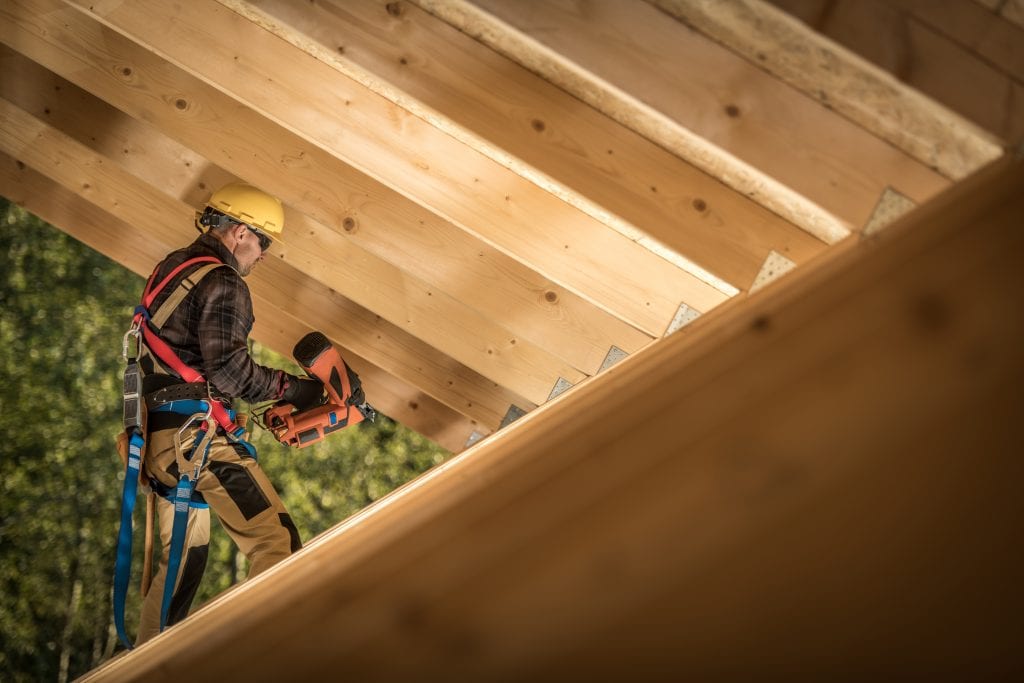Last Updated on April 29, 2024
Understanding the Importance of Hiring the Right Roofing Contractor
This checklist will serve as a useful guide when and if you need to hire contractors to work on your home repair project.
I have often noticed in my contracting career that many people have had bad experiences when hiring contractors to perform work on their home. And they have had poor workmanship, which leads to even bigger problems. One reason why this happens is that they never asked the right questions, and the contractors themselves are usually scared and don’t ask proper questions.
Remember, contracting should not be a game of chance. You’re getting ready to spend a lot of money perhaps, and you need the money to go where you want it to – not to stress, and certainly not to fighting.
So, after you decide that you want a new roof, or new paint, or maybe a new kitchen, you need to become as clear as possible about what you want out of the project. That way, you will know the right questions to ask the contractor.

First Steps In Choosing a Contractor
The first things you should do are:
- Clearly define what you want. Don’t let cost be a factor here – this is your Wish List.
- Start gathering up informational content on what you want. Any building supply store like Home Depot, Lowes or Menards (or whatever your go-to stores are), will have brochures, materials, and ideas – as well as material prices.
- Start gathering up informational content on what you want. Any building supply store like Home Depot, Lowes or Menards (or whatever your go-to stores are), will have brochures, materials, and ideas – as well as material prices.
- Once you have that information, you can use a quick rule of thumb to roughly estimate your project cost – take the total material cost and multiply that by 3. This will be relatively close to what a contractor may charge. So, for example, if you have $10,000 in material, you should be close to $30,000 in total construction costs, give or take some. (This might seem like a lot, but keep in mind that not only is there labor involved, but also additional materials that aren’t obvious. For example, if it’s a tile floor, you could be looking at tile plus cement board, fasteners, mortar bed, grout, sealant, and consumable supplies.
Where to Find Potential Contractors
…Or, Where Not to Find Them…
Now that you’re armed with a rough cost, let’s move forward with getting some estimates. So, just how do you find a contractor??? Believe it or not, the best place to start looking first is NOT in the Google Ad listings. And while we’re at it, stay away from Angie’s List, Home Advisor, Thumbtack, and similar sites that appear at the top of those listings. That advice may not sound intuitive – those sites are at the top of search results, after all. The question to ask, though, is why are they at the top of those results? Is it because they’re a top rated contractor? The surprising answer is no! Those listing companies sell top search results positions to the highest bidding contractors. If they pass the background check, and then pay the fee, they’re in. That is, in my opinion, deceitful at best. Don’t fall into that mess. You end up with a contractor who bought his way to the top of the list, and now has to make up that very high (and believe me, it’s a lot of money) advertising cost from his job. Who ends up paying? Yes, you do. Either they have to charge more, or they have to cut expenses The bottom line here is that being on a listing service does not guarantee you great results.
Find Recommendations
Instead, start with your friends and family. Ask them for recommendations. This doesn’t mean to blindly jump in, sign a contract, and get right to work with some contractor, just because they worked on Aunt Sallie’s joint. Even if you have a strong recommendation, that does NOT necessarily mean that contractor is the right one for your project. But it’s a good place to get names to potentially work with.
Check Online Reviews
Another area to check is obviously online, and look at reviews. Keep in mind that there is no perfect contractor. Also be aware that you can always find someone who didn’t like paying their deductible (it’s the law) and got revenge by leaving a 1 star, scathing review. However, a good contractor is going to have a lot of 5 star reviews and leaves a trail of happy customers. So, consider contractors who consistently receive at least 3 to 5 star reviews. Also pay attention to whether they have enough reviews – most people have two or three friends willing to leave a review, but a good business will have many more good reviews than that.

How to Get A Great Estimate
Hint – It’s Not What You Think
By now you should have identified a couple of contractors to consider further. The next stage is getting an estimate.
Pay close attention here. The old adage to “get three or more estimates” is just insane, especially if you don’t understand what you’re getting or how to compare those estimates. What’s worse, is that the insurance industry has promoted this idea to the point that it seems like common sense. And the unspoken goal seems to be to get the lowest price, not the best estimate. “What’s the difference?” you might be wondering…
What’s Wrong With It?
Typically, the higher bids end up justifying your lowest bid. Usually, the only reason there is a low bid is because you weren’t clear on what you wanted, and the contractor told you what you wanted to hear or completely left out important things. (There are also contractors who will intentionally low-ball bids, purposely leaving off things they will have to supplement for later. Others just don’t know how to do good work, they hire cheap labor, or sometimes they have too much on their plate and you’re never a priority – which can translate into jobs that drag on for weeks or months.)
Where Did You Find That?
Let’s say you go to the grocery store, and see that all the good steak packages are $18-$25 each. You ask the stocker if there are any cheaper ones, and he runs to the back and brings out another one, says it’s only $2.00. You might wonder what’s wrong with it, and if that steak was on the floor last week and someone just found it. Do you feel lucky? Similarly, when you have a low estimate, you should wonder what’s wrong with it, and are you risking your home. A poorly installed roof that leaks can cost you tens of thousands of dollars in hidden damage. Go with the low bid at your own risk… do you feel lucky?
The saying “you get what you pay for” is another one to keep in mind when looking at estimates. Why are the higher bids higher? Are they really just around too much roof adhesive and asking too much? Or did they take more time to really understand exactly what you want, whereas the lower bidding contractors just glossed over details? There’s nothing wrong with calling a more expensive contractor and asking why their estimate is higher. Sometimes, they will explain details you hadn’t considered. Sometimes, they will have misunderstood an aspect of the work. Plus, they may be willing to match part or all of a lower bid if the price was fair and the work and materials were the same. Or, maybe they are providing more value or addressing something important that the other contractors missed. This could be a better warranty or materials, or doing a more complete job (for example, replacing flashing with new, instead of reusing bent, rusty flashing).
It’s important to understand that contractors with higher estimates are often providing much more value than the difference in price.
So you can see that whether you’re talking with a contractor about your home remodeling, re-roofing, gutters, house painting, or landscaping, you must ask the right questions, and make sure you communicate the full scope of the work you want done. Otherwise, you’re only hoping that you’re giving money to someone to read your mind. I know a lot of contractors, and none of them are psychics!
Estimate Wrap-up
Now that we have muddled through all that, here’s what we’ve learned.
- Research your products.
- Multiply the the total cost of materials by three to get a ballpark number.
- Ask the right questions – remember that you are interviewing first, and you want estimates to reflect the full scope of the work you want included, but not what you don’t want done.
You never give up your secrets until you have made up your mind to move forward. If your project is large enough, it might be a good idea to have a memorandum of understanding on how you will move forward.
Now its time to put it all together.

Clarifying the project
Once you have gathered all your information and data relating to your building project, you will need to use clear, quantifiable questions:
- What? What is the project you are wanting to do?
- What? What are the material types that you’re looking for?
- Who? Who are the players? Contractor, Architect, Engineer.
- When? When will the drawings and estimate be completed?
- What? What are the line item details? This means that you want clarity in the estimate, from the studs out. Drywall thickness, texture type, floor trim size, electric cover plates, wall copings, paint color, etc. (See one of my sample estimates here)
- How Much Money? What are the costs associated with each of the line items? This is where you take your Wish List and start narrowing it down, or go with similar but less expensive items. A good contractor can help you with suggestions where you could save on costs.
- How Much Time? Clarity is important. It is essential to have an expected start time and time of completion. During the project, if there are known delays or potential delays, be sure to call these out to your contractor. Ask your contractor for daily reports or create your own and share them, to make sure you both understand what is going on. This isn’t so you can micro-manage, but so that you can be involved, avoid surprises, and keep your expectations realistic. It’s easy to find yourself overstepping your bounds, sticking your nose into every detail, when you don’t know what’s going on. So again, be clear up front that either they will give you daily, or least reasonable, updates, or you’re going to do my own digging around in the project and ask a lot of questions. Believe me, you will get your reports!
- General Conditions. Every contractor will have “general conditions.” These are basically incurred costs that don’t involve swinging a hammer – things like a portable toilet, a boom lift, labor for safety management or daily cleanup, etc. I have seen a lot of disagreements on job sites because the owners didn’t understand the general conditions of the contract. The contract is always the final authority for ALL answers in a discrepancy. It is what will be looked at by the courts if a dispute ever goes that far. With a good contract, and clear understanding and communication, that won’t ever happen.
- The Contract. It is your duty to fully read the contract. The contract should contain a detailed scope of work, the total cost, and the payment terms. The fine print will identify all the supporting conditions, inclusions and exclusions to the agreement. Make sure that you understand the entire agreement, before you sign. Also make sure the contract is subject to the State Laws of the state where you live. The last thing you want is have to travel from Missouri to New York to defend yourself.
- Profit. You need to know that a contractor has to make a profit to stay in business – otherwise, they won’t be around. Profit is a good thing. It allows a company to grow. It helps the local community, and helps the company’s employees feel confident about who they work for. It helps the contractor hire more highly skilled, quality subcontractors, and in turn helps you get a great job. Don’t think that the difference between material costs and contract price is all profit, either. Of course there is labor, but there are other expenses a good contractor incurs, too. Some examples are: vehicles, office space, equipment and tools, administrative staff salary, advertising (so you could find them in the first place), website, fuel, and of course salaries of people who do your estimate, sit at a computer at night updating a project or answering status questions, running to the hardware store for another box of nails or sheet of plywood, researching where to find that certain tile you liked for a better price, etc. The profit margin a contractor actually keeps is much smaller than most people imagine, which is why so many of them go out of business.
Key Takeaways
There is never a need for multiple estimates. You only need one good estimate.
Clearly identify the products you want. Then research and note the line item prices.
Eliminate as much ambiguity from the contract as possible. Make sure all job line items and products are clearly defined.
Agree with the contractor on your role in the process, and what that role looks like.
Understand how construction contracts work: Time of Completion, Payment terms, Change Orders, Warranty, etc.
I’ve been in construction for over 30 years. Believe me, if any of the key elements above are missing, it makes it very hard for both the contractor and the building owner. The above only reflects a quick overview, of the How to Hire a Contractor. Feel free to reach out with any questions you may have for your next building project.

